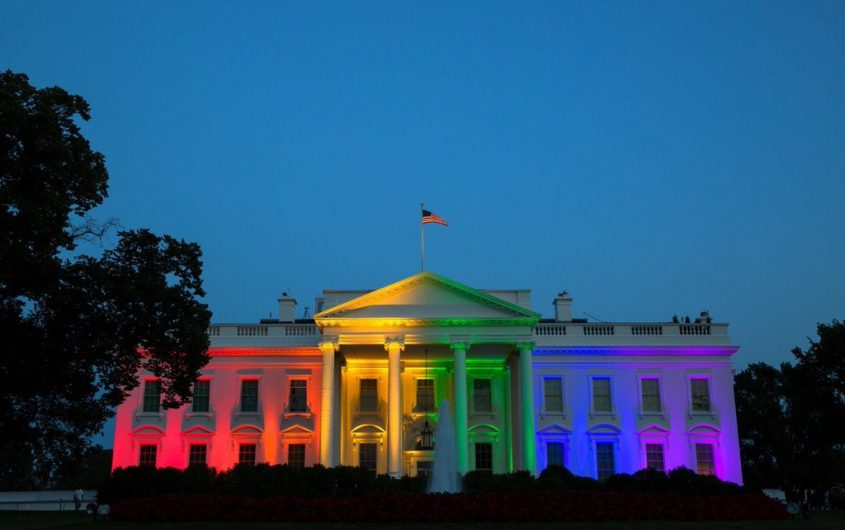
Rainbow Politics: Comparing LGBT+ Rights in Germany and the United States

Dalton Lauderback
George Washington University
Dalton Lauderback is a Research Intern at AICGS for Fall 2018. He contributes to the AICGS website, conducts research for current projects and resident fellows, manages the outreach database, and supports event organization and coordination. Currently, Mr. Lauderback is pursuing a master’s degree in International Affairs with concentrations in Europe, Eurasia, and Russia and International Law and Organizations at George Washington University’s Elliott School of International Affairs. He is particularly interested in transatlantic relations, EU enlargement, gender issues, and the role of international institutions. Before joining AICGS, Mr. Lauderback studied abroad in Switzerland, worked as a Fulbright ETA in Germany, and interned at the U.S. Embassy in Austria.
On October 1, 2017, Karl Kreile and Bodo Mende exchanged vows at the town hall in Schöneberg—the first same-sex couple married in Germany. More than two years earlier, the United States legalized same-sex marriage nationwide following the Supreme Court decision in Obergefell v. Hodges. In addition to gaining the right to marry, public opinion of the LGBT+ community has generally improved in both Germany and the United States. Yet, despite the progress made for LGBT+ rights in both countries over the course of the past decade, both the United States and Germany can do more to uphold and advance the rights of their LGBT+ populations.
Germany: A Forerunner in LGBT+ Rights
Germany was a pioneer in the LGBT+ movement—in fact, the very notion of an identity based on a fixed sexual orientation was first articulated in Berlin, and the word Homosexualität was first published in an 1869 German pamphlet on the Prussian anti-sodomy law.[1] Despite early progress, same-sex sexual activity became illegal in Germany in 1871, and these laws were extended during the Nazi period to murder thousands of homosexuals in the Holocaust. Sexual activity between people of the same sex was finally made legal in 1968 in East Germany and in 1969 in West Germany.
Beginning in 2001, German same-sex couples were able to enter into legal life partnerships, which granted various rights similar to those of marriage. Proposals to allow same-sex couples to marry were subsequently blocked by the CDU/CSU. Finally, in 2017, Chancellor Angela Merkel decided to allow her party members to vote their conscience rather than the party line. On June 30, 2017, moderate CDU/CSU members joined the SPD, Greens, and Linke in voting 393 to 226 in favor of same-sex marriage. Chancellor Merkel voted against the bill.
Germany has anti-discrimination laws in place that protect the LGBT+ community from discrimination in employment, housing, and the procurement of goods and services on the basis of sexual orientation or gender identity. The laws also protect against hate speech.
Germany has anti-discrimination laws in place that protect the LGBT+ community from discrimination in employment, housing, and the procurement of goods and services on the basis of sexual orientation or gender identity. The laws also protect against hate speech. Additionally, same-sex couples are allowed to adopt children together (since 2017) and LGBT people can openly serve in the military (since 2000). Transgender individuals have legally been able to change their gender without surgery or sterilization since 2001 and Germany has allowed a third gender option on legal forms since 2017.
Despite Germany being one of the most LGBT+ friendly countries in the world, there are still improvements that can be made. Homosexual men have been allowed to donate blood since 2017, but only if they have not engaged in same-sex sexual activity in the proceeding twelve months. Even if a man has only had protected sex with one same-sex partner in that period, he is still barred from giving blood—but heterosexuals who engage in unprotected sex with multiple partners could legally donate blood. This difference is discrimination, pure and simple. Germany could pass legislation ending the twelve month wait-period for men who sleep with men.
Furthermore, while all German medical institutions are opposed to the use of conversion therapy, there is still no federal law against the practice. Though there have been recent petitions to ban conversion therapy, the Bundestag has yet to bring forth legislation outlawing the practice. As conversion therapy has been shown to harm LGBT+ individuals, Germany could pass legislation making the practice illegal.
United States: A Rainbow Wave?
While the anticipated blue wave for the 2018 midterm election turned out to be more of a splash, the election can more accurately be described as a rainbow wave. Not only did a record number of LGBT+ run for office, but 164 LGBT+ individuals were elected—including eight in the House and two in the Senate.
In June 2003, the U.S. Supreme Court ruled that same-sex sexual activity was legal; before the ruling, sexual activity between individuals of the same sex was illegal in fourteen states. Ten years later, in United States v. Windsor, the Supreme Court struck down Section 3 of the Defense of Marriage Act, allowing the federal government to legally recognize same-sex marriages. Finally, on June 26, 2015, the Supreme Court ruled that same-sex couples are legally permitted to marry nationwide.
While the laws and protections for the LGBT+ community in Germany are almost all implemented at the national level, the status of legislation in the United States is much more fractured, with states enacting various standards of protection.
While the laws and protections for the LGBT+ community in Germany are almost all implemented at the national level, the status of legislation in the United States is much more fractured, with states enacting various standards of protection. There is no federal anti-discrimination law protecting people on the basis of sexual orientation or gender identity or expression—thus, LGBT+ people face discrimination that cis-gender, heterosexual people do not encounter. Only twenty states have anti-discrimination laws for housing or employment for both sexual orientation and gender identity. Access to public spaces such as bathrooms, based on one’s gender identity versus sex at birth, varies by state. Additionally, only some states recognize sexual orientation and/or gender identity in hate crime laws. Given these variances harm LGBT+ individuals in some states, the federal government could implement national anti-discrimination laws with protections for LGBT+ peoples.
In 2010, “don’t ask, don’t tell”—which only allowed gays and lesbians to serve in the military if they did not reveal their sexual orientation—was overturned, allowing LGB individuals to openly serve beginning in September 2011. In 2016, the ban on transgender service people was lifted, but this was challenged in July 2017 when President Trump declared that transgender people would again be barred from service. The military continues to allow openly transgender people to serve. Despite the progress that has been made in regard to military service, transgender women are still required to register for the selective service program if they were marked male at birth. The selective service program does not require cis-women to register, and thus should not demand trans-women to do so.
Like Germany, the United States requires men that sleep with men to not have had intercourse within twelve months before donating blood and does not ban conversion therapy. Unlike Germany, the United States does not legally recognize genders outside of the traditional binary (though some states have begun offering more gender neutral or inclusive categories). Furthermore, some states do not allow transgender individuals to change their sex on their birth certificates.
Despite years of improving public opinion, a poll released in 2017 revealed that Americans had become less accepting of LGBT+ people than the previous years—only 49 percent of cisgender, heterosexual Americans agreed with feeling “very” or “somewhat” comfortable around LGBT+ people. Hate crimes against LGBT+ Americans also increased in 2017. According to GLAAD President Sarah Kate Ellis this development is “unsettling fallout that began with the 2016 presidential election.” With an administration actively scrapping LGBT+ issues from government websites and reversing protections, it is not surprising that many LGBT+ people are worried.
What the rainbow wave will mean for the future of LGBT+ rights and protections remains to be seen, but the recent election provides hope that a more equality driven agenda can be pursued, despite hostility from the current administration.
Outlook
Both the United States and Germany have improved significantly in their acceptance and protection of LGBT+ people. Despite the progress that has been made, both countries could still do more to ensure that the LGBT+ community is protected equally under the law. The United States could follow Germany’s lead and institute nationwide anti-discrimination laws that include protections on the basis of sexual orientation and gender identity and address the other forms of discrimination discussed above. Germany could legalize equal rights to donate blood and ban conversion therapy. Additionally, given their prominence on the world stage, Germany and the United States can not only lead by example, but also actively push for LGBT+ protections globally.
Growing populism and politically uncertainty in Germany and the hostility of the American administration will undoubtedly make pursuing a pro-LGBT+ agenda more challenging. Still activists in both countries can continue to push for greater protections. Public opinion shows that large numbers of the population in both countries support equal protections for LGBT+ people, and this support can be harnessed to push for further reforms. While the sheer number of pressing issues on the transatlantic agenda may seem daunting, progressive leaders and activists in both countries can ensure that LGBT+ concerns do not become peripheral issues and that the fight for equality continues.
[1] From the introduction of Robert Beachy, Gay Berlin: Birthplace of a Modern Identity (New York: Vintage Books, 2014), xii.









